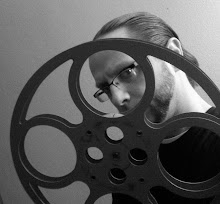The kaiju is a
Japanese film genre which typically features giant monsters stomping around,
smashing buildings, swatting aircraft, and fighting each other. The creatures,
often referred to as kaiju
themselves, have been exploited for decades upon decades by international and
Hollywood filmmakers to the point where the genre has hit a wall despite recent
attempts to reinvent the idea. In director Nacho Vigalondo’s COLOSSAL, things
are not quite re-invented, but instead twisted and turned in a way that will
make those all those decades of kaiju be
seen in a new light.
Gloria (Anne Hathaway), is a hard-partying, talented yet
unemployed writer, who after a night of binge-drinking is thrown out of her shared
apartment by her (now ex) boyfriend Tim (Dan Stevens). Returning to her
childhood suburban home, she re-acquaints with former schoolmate Oscar (Jason
Sudeikis) and continues drinking. On the other side of the world in Korea, a
giant monster appears and causes death and destruction…and Gloria suddenly
realizes she has a connection to it during a certain time of the day.
The central idea behind COLOSSAL is high-concept and asks us
to buy into a lot. The existence of giant monsters is just the start of it, and
buying into the connection between Grace and the kaiju also takes some getting used to. The connection between them
is nearly like a puppet show; as Grace goes, the monster goes, right down to
moods and physical movement. Things take a turn when a second monster appears in
the form of a giant robot which can be controlled by Jason. COLOSSAL then turns
dark, as Jason turns controlling and physically abusive towards Grace, and as
they fight…the monsters fight.
The powdered-keg relationship between Grace and Jason is
where COLOSSAL finds its needed grounding. Many of us may find it difficult to
watch, but watching Grace go through stages of helplessness from verbal and
physical abuse becomes the emotional root of the film, and the monsters become
secondary. Director Nacho Vigalondo may be playing with heavy-handed themes
here (we get it, the kaiju represent
the monsters in us all), but it works, to both dramatic and comedic effect.
Vigalondo has a great balance of comedy and drama going on,
as the battles between the characters (drama) are copied by the monsters
(comedy). This is made better by the design of the kaiju which is funny and terrifying at the same time. The
connection between the humans and the monsters is made believable by some sharp
editing and clever uses of social media, and there is a fascination that hangs
over the film as we wait for Grace to pull herself out of what she’s under and
for an explanation to the mystical connection.
Anne Hathaway is fantastic; playing a troubled drunk going
through a mid-life crisis and displaying a gift for physical comedy. Jason Sudeikis
is also great, and becomes an effective screen-villain right in front of our
eyes. The rest of the cast, which includes Dan Stevens, Tim Blake-Nelson, and
Austin Stowell are all very good.
The best character in COLOSSAL is the one that never shows
up. Every goddamn kaiju film always
seems to have one old guy who is the only character who knows what is going on while the rest of the dumbasses lumber around. That old
trope is thankfully avoided here, which leaves the characters to figure things
out for themselves and actually perform work to get there. That helps separate
COLOSSAL from the large pack of giant monster films, and the idea of humans controlling
kaiju will make us view all those old
movies a little differently. Driven by character and creativity, COLOSSAL is a
brilliant take on an old idea.
BOTTOM LINE: See it


No comments:
Post a Comment
A few rules:
1. Personal attacks not tolerated.
2. Haters welcome, if you can justify it.
3. Swearing is goddamn OK.